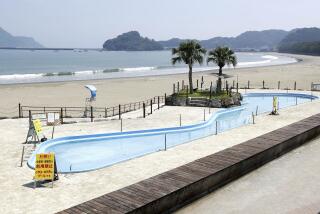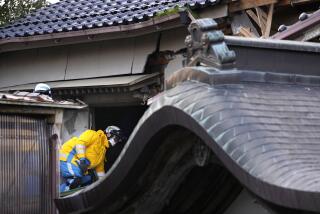Japanese official admits disaster response was lacking
- Share via
Reporting from Beijing — Japan’s top government spokesman said Friday that the country’s leadership was overwhelmed by last week’s earthquake and tsunami, which slowed its ability to respond to the following humanitarian crisis and nuclear emergency.
“The unprecedented scale of the earthquake and tsunami that struck Japan, frankly speaking, were among many things that happened that had not been anticipated under our disaster management contingency plans,” Chief Cabinet Secretary Yukio Edano said, according to the Associated Press.
“In hindsight we could have moved a little quicker in assessing the situation and coordinating all that information and provided it faster,” he said.
Photos: In Japan, life amid crisis
The admission comes as dissatisfaction with the central government’s handling of the disaster aftermath intensifies, not just among ordinary Japanese, but local officials. Many Japanese say they do not trust that Tokyo or power company officials are admitting the true severity of the nation’s problems.
Compounding the lack of trust is the fact that hundreds of thousands are running short of basic necessities such as food and fuel in Japan’s crippled northeast, where unseasonably cold weather is adding to the everyday misery.
Late on Friday, Prime Minister Naoto Kan said that the government has told the public everything about the accident at the Fukushima nuclear plant. “Edano and I have been disclosing all of the information that we had,” he said. Earlier, Kan promised in a meeting with the head of the International Atomic Energy Agency to disclose as much information as possible about the unfolding nuclear crisis.
“The situation at the nuclear plant remains unpredictable,” Kan said in the nationally broadcast news conference. “We will definitely overcome this crisis. I want people of this country to feel safe again.”
Kan said he was convinced Japan would overcome its difficulties, though the challenges faced at the Fukushima Daiichi nuclear complex 150 miles north of Tokyo remain uncertain.
“We will rebuild Japan from scratch,” he said, according to the Associated Press. “We must all share this resolve.”
In recognition that the crisis at the nuclear plant could have wider consequences, Japan’s nuclear safety agency raised the severity level of the nuclear emergency to 5 from 4 on a 7-level international scale. That puts the Fukushima shutdown on par with the Three Mile Island accident in 1979. The Chernobyl disaster in 1986 was rated a 7.
The higher severity level did not reflect any changes at the Fukushima plant, officials told the Associated Press, but signaled the crisis had been improperly assessed. Japan has asked the United States for help with the crisis. A U.S. military firetruck was one of several that doused the No. 3 reactor at the Fukushima plant with water Friday.
In his meeting with reporters, Kan also called on unaffected prefectures to take in refugees from Japan’s devastated coast. About 370,000 people are reportedly staying at shelters.
The country observed a moment of silence in honor of the victims. The official death toll from last Friday’s disaster climbed to 6,911 Friday, making it deadlier than the 1995 earthquake in Kobe. The final toll is expected to be well over 10,000.
More to Read
Sign up for Essential California
The most important California stories and recommendations in your inbox every morning.
You may occasionally receive promotional content from the Los Angeles Times.











